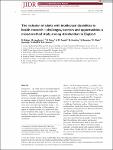The inclusion of adults with intellectual disabilities in health research – challenges, barriers and opportunities: a mixed‐method study among stakeholders in England
| dc.contributor.author | Bishop, R | |
| dc.contributor.author | Laugharne, R | |
| dc.contributor.author | Shaw, N | |
| dc.contributor.author | Russell, AM | |
| dc.contributor.author | Goodley, D | |
| dc.contributor.author | Banerjee, S | |
| dc.contributor.author | Clack, E | |
| dc.contributor.author | Shankar, R | |
| dc.date.accessioned | 2023-10-13T08:02:58Z | |
| dc.date.available | 2023-10-13T08:02:58Z | |
| dc.date.issued | 2024-02 | |
| dc.identifier.issn | 0964-2633 | |
| dc.identifier.issn | 1365-2788 | |
| dc.identifier.uri | https://pearl.plymouth.ac.uk/handle/10026.1/21410 | |
| dc.description.abstract |
Background The study aims to understand system barriers to research participation for people with intellectual disabilities. Methods A mixed-methods approach examined the inclusivity of people with intellectual disabilities (IDs) in a random sample of National Institute for Health and Care Research (NIHR) studies conducted in 2019–2020. An online questionnaire (stage 1) was sent to the selected studies lead investigators. An expert by experience panel of 25 people with intellectual disabilities (IDs, stage 2), discussed the stage 1 feedback. Descriptive statistics for quantitative data and thematic analysis for qualitative data was conducted. Results Of 180 studies reviewed, 131 studies (78%) excluded people with IDs. Of these, 45 (34.3%) study researchers provided feedback. Seven (20%) of the 34 studies which included people with IDs gave feedback. Of all respondents over half felt their study had some relevance to people with IDs. A minority (7.6%) stated their study had no relevance. For a quarter of respondents (23.5%), resource issues were a challenge. Qualitative analysis of both stages produced four overarching themes of Research design and delivery, Informed consent, Resource allocation, and Knowledge and skills. Conclusion Health research continues to exclude people with IDs. Researchers and experts by experience identified non-accessible research design, lack of confidence with capacity and consent processes, limited resources such as time and a need for training as barriers. Ethics committees appear reluctant to include people with cognitive deficits to ‘protect’ them. People with IDs want to be included in research, not only as participants but also through coproduction. | |
| dc.format.extent | 140-149 | |
| dc.format.medium | Print-Electronic | |
| dc.language | en | |
| dc.publisher | Wiley | |
| dc.subject | Ethics | |
| dc.subject | Intellectual Disability | |
| dc.subject | (Global) Developmental Delay | |
| dc.subject | Methodology in research | |
| dc.title | The inclusion of adults with intellectual disabilities in health research – challenges, barriers and opportunities: a mixed‐method study among stakeholders in England | |
| dc.type | journal-article | |
| dc.type | Article | |
| plymouth.author-url | https://www.ncbi.nlm.nih.gov/pubmed/37815212 | |
| plymouth.issue | 2 | |
| plymouth.volume | 68 | |
| plymouth.publication-status | Published | |
| plymouth.journal | Journal of Intellectual Disability Research | |
| dc.identifier.doi | 10.1111/jir.13097 | |
| plymouth.organisational-group | |Plymouth | |
| plymouth.organisational-group | |Plymouth|Faculty of Health | |
| plymouth.organisational-group | |Plymouth|Users by role | |
| dc.publisher.place | England | |
| dcterms.dateAccepted | 2023-09-19 | |
| dc.date.updated | 2023-10-13T08:02:58Z | |
| dc.rights.embargodate | 2023-10-21 | |
| dc.identifier.eissn | 1365-2788 | |
| rioxxterms.versionofrecord | 10.1111/jir.13097 |


